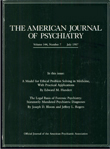The Reproduction of Evil: A Clinical and Cultural Perspective
Evil is a topic from which psychiatrists all too often shrink. We are taught in our days of training not to make value judgments about our patients. This is a noble and commendable injunction and—in everyday practice—easily adhered to, since very few patients engage in the kind of behaviors that would be labeled “evil” in everyday (though not in psychiatric) parlance. Evil is not in DSM-IV, but it exists out there in the world and may be roughly defined as the conscious and carried out intent to inflict severe psychological or physical pain on another. Thus, those who habitually commit torture, malicious slander, the sadistic treatment of intimates or strangers, and such like are said to be “evil.”
Sue Grand has made a laudable attempt to venture into this problematical domain. Her book alternates between theoretical passages and illustrative vignettes. Her style is often poetic and self-revelatory; her clinical vignettes are both moving and well-chosen. Many of the theoretical passages reflect the influence of Melanie Klein and would not always be readily grasped by readers unfamiliar with psychoanalytic formulations in general or Kleinian metapsychology in particular. One could wish for more clinical evidence to support some of the author’s contentions. Grand makes an important distinction between people who have committed evil (near-lethal abuse of spouses or children or heinous murder, for example) but who are able (through the help of therapy, for example) to experience remorse and repentance and those who are incapable of these humanizing attitudes. She writes, and I applaud her for doing so,
I am opposed to the forgiveness of the unrepentant; I believe it facilitates…evil’s reproduction. I am opposed to any form of analytic moral neutrality that appears to offer moral acceptance or absolution for the patient’s malevolence. (p. 156)
She argues for the use of “object-related hatred” as a normal response of the therapist to evil, since “when the perpetrator is not seen through condemnation, nothing contains him. Condemnation, justice, reparation: these are the first conditions for…restraint and redemption” (p. 158). In contrast, Grand speaks of vengeance as a sadistic defense and thus an agent of what she calls “malignant dissociative contagion” of a sort that perpetuates the cycle of evil. She summarizes her points in the final chapter: the sequence of condemnation, justice, reparation, and redemption potentiate subject-to-subject dialogue. The sequence of vengeance, humiliation, violation, and cruelty reproduce evil. Grand maintains, and makes a good case for, the view that forgiveness is not the entitlement of the perpetrator. When it occurs (on the part of the victim), it is a “gift of extraordinary humanity: it is a recognition of transformation, of the authenticity of remorse, of the desire to make reparation” (p. 159). As for “extraordinary humanity,” Grand gives the example of a Tibetan monk who had been imprisoned many years in China. When the Dalai Lama asked him what was his greatest danger in the prison, the monk said what he feared most was losing his compassion for the Chinese (p. 151).
Granted that psychiatrists (apart from specialists in forensics) seldom encounter evil in its most undiluted forms, I believe that those of us whose experience does carry us into this realm will be well guided by the principles enunciated in Grand’s book.



